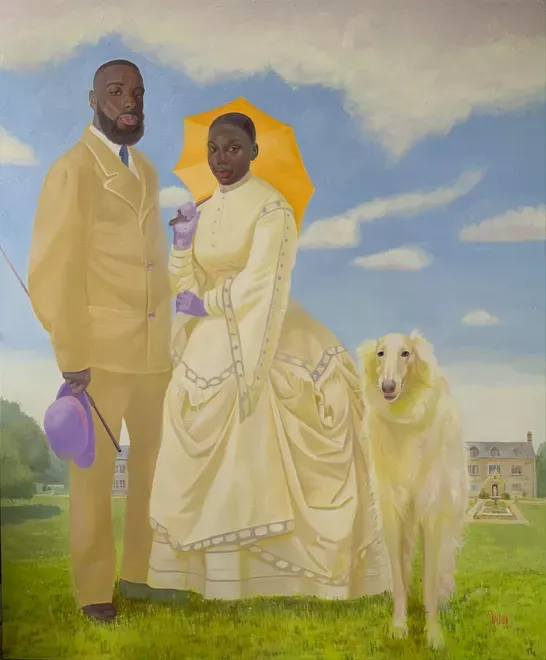Damilola Opedun

The Artist Who Transforms Lagos' Floating Slums Into Venice
Damilola Opedun isn't just painting pictures—he's rewriting narratives. This Nigerian artist has spent years documenting life in Makoko, one of Lagos' most marginalized communities, and transforming those experiences into powerful art that's gaining international recognition.
His work challenges how we see poverty, community, and resilience, while his humanitarian efforts prove that art can be a force for real social change.
From Academic Excellence to Artistic Purpose
Opedun graduated from Auchi Polytechnic in 2010 as the best student in his class—a foundation that speaks to his dedication and precision. But rather than following traditional career paths, he chose to become a full-time studio artist in 2015, driven by a vision that extends far beyond personal success.
Working primarily in pastels and oils, Opedun has developed a distinctive style that captures both the harsh realities and profound beauty of everyday Nigerian life.
Makovenice: Where Lagos Meets Venice
Opedun's most celebrated body of work, "Makovenice," is a brilliant conceptual blend that combines Makoko (Lagos' floating slum) with Venice, Italy. This isn't just clever wordplay—it's a powerful statement about how perspective shapes reality.
What is Makoko? It's a sprawling community built on stilts over Lagos Lagoon, often dismissed as a slum but home to thousands of people with rich cultural traditions and remarkable resilience.
The Venice Connection: By linking Makoko to Venice—a city celebrated for its water-based architecture—Opedun forces viewers to reconsider their assumptions. Both are communities built on water, but only one is romanticized by the world.
Through this series, Opedun reveals the beauty, dignity, and complexity within Makoko, showing that marginalized communities have their own forms of sophistication and culture that deserve recognition rather than dismissal.
Art as Social Action
What sets Opedun apart from many contemporary artists is his commitment to giving back to the communities he paints. In 2015, he founded The Seed of True Vine Foundation, which provides free art education to children in Makoko.
Why This Matters: These art classes aren't just about teaching drawing techniques—they're about giving kids new ways to express themselves, building confidence, and opening doors to opportunities they might never have imagined.
The Impact: Despite facing various challenges over the years, Opedun has continued these classes, demonstrating that his commitment to community goes beyond his art sales and gallery exhibitions.
The Philosophy: Opedun believes art can "bridge the gap between the underprivileged and the broader intellectual and artistic communities"—essentially using creativity to break down social barriers.
Recognition and Reach
Opedun's work has gained attention both locally and internationally:
Gallery Representation: His pieces are exhibited at respected venues like Alexis Gallery in Lagos, and he's gained representation with international galleries including AG18 Gallery in Vienna.
Global Interest: International collectors and art enthusiasts are increasingly drawn to his work, recognizing both its artistic merit and cultural significance.
Media Coverage: Art publications and Nigerian media have featured his work, helping to spread awareness of both his artistic vision and humanitarian efforts.
The Bigger Picture
Opedun represents a new generation of African artists who refuse to be defined by Western art world expectations. Instead of creating work that simply appeals to international markets, he's building authentic connections between his local community and global audiences.
His approach demonstrates that contemporary African art doesn't need to choose between local relevance and international recognition—it can achieve both by staying true to authentic experiences and perspectives.
The "Makovenice" series exemplifies this balance, using familiar artistic concepts (the romance of Venice) to make unfamiliar realities (life in Makoko) accessible to global viewers without exploiting or oversimplifying those realities.
Why Damilola Opedun Matters Now
In an art world increasingly focused on social justice and authentic representation, Opedun offers a model for how artists can engage meaningfully with social issues without becoming preachy or performative.
His work speaks to several important contemporary conversations:
Urban Development: As cities worldwide grapple with informal settlements and housing inequality, Opedun's work provides nuanced perspectives on these communities.
Cultural Representation: His art shows how marginalized communities can be portrayed with dignity and complexity rather than as objects of pity or fear.
Artist Responsibility: Through his foundation work, he demonstrates how successful artists can use their platforms to create concrete change in their communities.
Following Damilola Opedun
You can see more of Opedun's work and follow his ongoing projects through:
Instagram: @opedun__art
Gallery Representation: AG18 Gallery (Vienna), Alexis Gallery (Lagos)
Art Platforms: Featured on Artsy and other international art platforms
For those interested in supporting his humanitarian work, The Seed of True Vine Foundation continues to operate art education programs in Makoko.
The Takeaway
Damilola Opedun proves that powerful art emerges when technical skill meets social consciousness. His work doesn't just document life in one of Lagos' most challenging communities—it transforms how we understand those communities and the people who live there.
By combining the aesthetic beauty of pastels and oils with urgent social themes, and backing up his artistic practice with concrete community action, Opedun represents the kind of engaged, authentic artistic practice that resonates in today's world.
Whether you encounter his work in a Lagos gallery or on an international art platform, you're seeing more than just paintings—you're witnessing an artist who believes that creativity can change not just how we see the world, but how we act within it.




